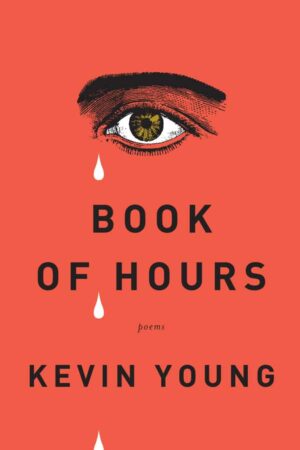Book of Hours
by Kevin Young
reviewed by Jason Tandon
The first two sections of Kevin Young’s latest poetry collection, Book of Hours, treat the accidental death of his father while hunting, illustrating a complex portrait of a grieving son. Throughout his career, Young has demonstrated a predilection for the pun, a device he uses in the poem “Bereavement” to mitigate his pain. The speaker finds his father’s dogs kenneled behind the empty house and quips, “I’ve begun to think of them / as my father’s other sons, / as kin. Brothers-in-paw.” But Young does not push the punchlines too far, concluding the poem on a note of responsibility and compassion:
I must give them away.
I must find for them homes,sleep restless in his.
All night I expect they pace
as I do, each dog like an eyeroaming with the dead
beneath an unlocked lid.
Young diffuses his grief with humor and by considering how his father’s death sustains the lives of others. In the poem “Charity,” he writes,
I weep. Then drive
everything, swaying
straight to Goodwill—open late—to live on
another body
& day.
Similarly, in the poem “Mercy,” he transforms organ donation into an occasion of arresting lyricism: “It was your liver/ lifted out of you / & set like a bloody stone / inside somebody / else to save.” His empathy extends so far as to declare in “Exit Music”: “May I bless the man / who shot you // May I hold you / as he must have / praying & cursing / … His long mile to the nearest / house for help.”
There are moments when, overcome by despair, the speaker longs to join his father in death, but ultimately the poems move toward acceptance. The speaker in “Wintering” experiences perhaps the book’s largest and most provocative epiphany:
Mourning, I’ve learned, is just
a moment, many,grief the long betrothal
beyond. Grief what
we wed, ringing us—
The metaphor suggests that grief is a partnership, a sacred exchange, neither a linear process nor something to overcome. While the word “ringing” primarily refers to a wedding ceremony, it also suggests the sounding of a bell. These moments of sorrow make us sensitive to joy, and the implicit image of the bell’s clapper cleverly mirrors this pendulum swing.
While the first two sections of Book of Hours are weighty with loss, Young changes course in the third section with poems that document the birth of his son. Titles such as “Breaking Water, ” “Crowning,” and “Jaundice” demonstrate young’s aesthetic that no subject is unworthy of poetic consideration, and convey his apprehension and wonder of having a child. A strong example of this tone change occurs in the poem, “Nativity.” Young, often inclined toward wordplay and rhyme, composes a declarative, rhetorical poem, as if the speaker is trying to convince himself of his claims:
I believe birth a lengthy process
meant to help us believe
in the impossible.[…]
I believe the body is meant
to emerge from another body,
to merge with it.
In “Colostrum,” though, Young tempers the tenderness he feels towards his unborn child with a realistic, even cynical, view of the world:
We are not born
with tears. Yourfirst dozen cries
are dry.It takes some time
for the world to arriveand salt the eyes.
The final section, “Book of Hours,” is a series of fifteen linked poems that takes its title from a medieval Christian prayer book. Not necessarily supplicant to God, Young puts his faith in poetry: his carefully measured lines, his images (often Biblical), his playful associations, and his ear for euphonic melody. Longing is the dominant tone here: the speaker is wracked with the desire to feel whole and happy in the midst of much loss (which, in this section, extends beyond his father’s death). This restoration begins with Young’s devotion to beauty and to his craft:
I want to lie
down like a lamb—down & down
till gone—shorn of its wool.
The coolof setting & rising
in this valley,the canyon between us
shoulders our echoes.Moan, & make way.
(“Black like an eye”)
Despite the book’s pervasive weariness, this poem ends with a resolute defiance. In one of the book’s final poems, too, Young’s optimism surges. The speaker, aboard a delayed flight, expresses his exaltation of life in that unlikely place:
We…
are liftedinto it, brightness
all about—O setting.
O the musicas we soar
is small, yet sating.
(“The sun’s small fury”)
Published on November 3, 2015

